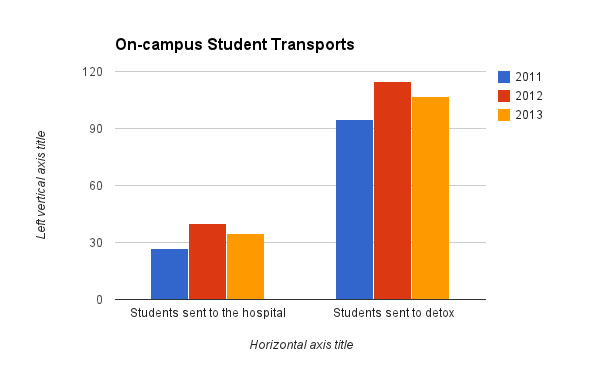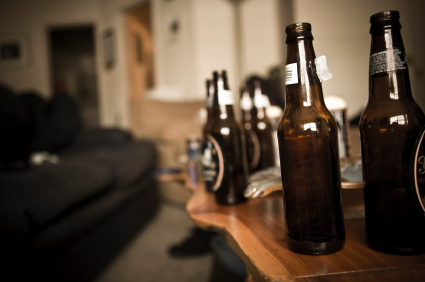After a record-high number of students were reported as being sent to hospitals and detoxification facilities last year, numbers have maintained their high levels this year, prompting concern from the administration.
According to Sgt. Stephen Banet of the Department of Campus Safety (DCS), there were 19 students sent to the hospital for alcohol overconsumption from September 2013 through January 2014, and 53 students sent to detoxification facilities. This continues a trend begun last year of significantly higher numbers of students requiring transport off-campus for medical care due to alcohol over-consumption.
The numbers are at similar levels to those seen from September 2012 to January of 2013, when 55 cases of students sent to detox were reported along with 28 hospital visits.Though Banet said he was happy to see the number of students sent to the hospital go down, he said the numbers are still raising alarms.
“We as a university have a long way to go in providing services,” he said, specifically citing a need for more alternative activities on campus.

Director of Emergency Medicine at Denver Health Chris Colewell said he has also seen a rise in the students coming to their emergency room for treatment.
“The amount of binge drinking, which you do see on college campuses, is certainly from our impression on the high side coming from DU,” he said.
Colewell said he has seen a gradual increase in students coming to the emergency department for treatment over the past five to 10 years, and has seen a change in attitude towards drinking come as part of the shift.
“There seems to be a very unconcerned kind of approach to it,” Colewell said. “I think the almost laissez-faire attitude of the students concerns me so much more, I don’t think they consider how dangerous it is.”
Numbers over the past two years; in particular, have skyrocketed according to annual DCS reports. In 2011 95 students were sent to detox, which saw a 21 percent rise to 115 in 2012. In 2013, 107 students were transported to detox for alcohol consumption.
“I am convinced that we are seeing more and more long-term alcohol issues, and its is not an uncommon way for it to start,” said Colewell.
This year, the university began looking at solutions through some campus initiatives, some of which were recently addressed by university administration. Last Friday, Provost Gregg Kvistad addressed the issue in an annual academic conference that focuses on a different topic each year.
Due to the administration’s concern, the focus this year was on the numbers of alcohol abuse reported on campus, featuring presentations from local and national experts. \
“What was presented … from one of our experts is that on many different variables, DU students’ drinking patterns are much worse than similar schools around the country,” said Health and Counseling Center (HCC) Director Alan Kent.
“There are a higher number of students engaging in risk drinking and binge drinking,” said Kent.
Kent said the report compared DU’s drinking rates with those of similarly sized private universities such as American University, Boston University and the University of Miami.
The HCC works towards prevention of student over-consumption of alcohol through drinking habit assessments and counseling with advisers on students’ drinking patterns. This year, they also instituted a new online alcohol consumption assessment, eCHUG, required for all first year students to take prior to coming to DU to assess their drinking patterns and risks. According to Kent, the latest statistics available show that there was a 48 percent increase in the number of students referred to the HCC in 2012-13 in regards to alcohol use.
Kent also added that data presented at Friday’s conference showed that students who attend DU already have a higher rate of drinking before coming to college, compared to national numbers.
“Nationally, two thirds of students didn’t drink before college, but DU’s numbers tend to be higher,” he said.
In response to the concern raised by these recent trends, Kvistad appointed the formation of the campus Alcohol Coalition at the beginning of the year, comprised of university staff and administration members, HCC staff, one graduate student representative and one undergraduate student representative.
Kent, who serves on the board, says the goal is to find ways to deter the level of drinking the university has seen in the past few years. Currently, according to Kent, the board is working on forming a spring quarter town hall to hear a student perspective on campus drinking habits.
“The goal is not to stop all students from ever drinking, the goal is to stop dangerous drinking. We want to hear from students to get as much of an idea as we can,” said Kent.
Moving forward, Kent hopes the council will be able to use information from the town hall meeting to make recommendations to the university on how to curb the number of students sent to the hospital and detox facilities.
“We see this as a public health issue,” said Kent. “Students really need to understand that all these actions are about health and safety and well-being.”











